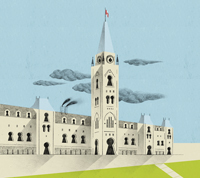 In the spring of 2009, the Obama administration made a momentous decision: to release the legal memos that green-lighted the torture of prisoners in U.S. custody. But the administration’s decision was not simply a matter of executive grace. It came after public interest organizations — including our own organization, the American Civil Liberties Union (ACLU) — requested the memos under the Freedom of Information Act and sued for disclosure.
In the spring of 2009, the Obama administration made a momentous decision: to release the legal memos that green-lighted the torture of prisoners in U.S. custody. But the administration’s decision was not simply a matter of executive grace. It came after public interest organizations — including our own organization, the American Civil Liberties Union (ACLU) — requested the memos under the Freedom of Information Act and sued for disclosure.
That strategy would not have worked in Canada. The U.S. Freedom of Information Act has many defects, but it is often an effective tool for the media, public interest organizations and citizens. Canada’s transparency advocates labour under a weaker law and confront a hostile bureaucratic and political culture that has not yet accepted that official records belong, presumptively, to the public. As a result, transparency remains largely a matter of executive grace. This is unfortunate. No democracy can thrive if citizens lack access to information that would allow them to evaluate their government’s policies.
Canada’s hostility to disclosure was on display in 2010 when the Government refused to disclose — even to members of Parliament — documents about potential Canadian complicity in the torture of Afghan detainees. The documents should have been released, with only those redactions necessary to protect genuine national security concerns. Instead, a committee of three MPs is now reviewing the documents in secret, only able to disclose information with the permission of a panel of retired judges. It would be hard to construct a more cumbersome process. Worse, it’s the result of a one-off political negotiation.
Sensible reforms to Canada’s access laws are overdue. For instance, while the Information Commissioner plays an important watchdog role, nothing prompts disclosure like the threat of a court order. Requestors should be able to go straight to court when records are not quickly disclosed. The law should also encourage openness by requiring the government to pay requestors’ costs. The current scheme has it backwards, often requiring requestors to pay the government’s fees for retrieving and photocopying records.
Canada should also adopt reforms to avoid the problems infecting the American laws. It should make clear that exemptions from the government’s disclosure obligations are to be strictly construed. It should also subject every exemption to a public-interest override.
Unfortunately, the government is pushing in precisely the wrong direction, arguing before the Supreme Court that the offices of federal ministers should be categorically excluded from access laws. If the Court accepts this alarming proposition, Canadians will be kept in the dark about what goes on in the offices responsible for running the government.
Finally, the public’s right to know should be protected by the Charter. Recent American experience shows why. In 2009, Congress enacted legislation to preempt the courtordered disclosure of photographs depicting U.S. torture of prisoners, depriving the public of information crucial to an ongoing national debate. That legislation was possible only because Congress is not constrained by a constitutional right of access to information.
A strong open government law is not in itself a guarantee that official secrecy will be appropriately cabined. Even with a decent law, championed by the media and transparency organizations, the U.S. government keeps too many secrets. But strong laws shift the balance of power from bureaucrats to citizens and reduce opportunities for official ineptitude, misconduct and criminality. When the public is kept in the dark, grave and mundane abuses alike can flourish unremarked and unaddressed. Canadians deserve better.
Jameel Jaffer is a Deputy Legal Director at the ACLU. Jonathan Manes is a fellow in the ACLU’s National Security Project. They both clerked at the Supreme Court of Canada. The views expressed here are their own and not necessarily those of the ACLU.
Illustration by Gracia Lam

